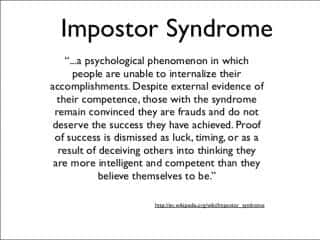Have you ever thought to yourself, “One of these days people will realise I don’t know as much as  they think”? Kate Winslet (Academy Award winning actress) is reported to have said “I’d wake up in the morning before going off to a shoot, and think, I can’t do this; I’m a fraud.” Maybe you live with that nagging feeling of being found out because you believe you’re not smart enough, not talented enough, don’t have the experience etc.
they think”? Kate Winslet (Academy Award winning actress) is reported to have said “I’d wake up in the morning before going off to a shoot, and think, I can’t do this; I’m a fraud.” Maybe you live with that nagging feeling of being found out because you believe you’re not smart enough, not talented enough, don’t have the experience etc.
Today’s blog post was inspired by a coaching client I was working with yesterday and a chat over a cuppa at lunchtime with one of my best friends – it really can be that common that I was talking about it twice within a few hours yesterday!
What is Imposter Syndrome?
At it’s most basic, it’s about self-doubt and about fear (feelings of worry, concern, being scared, of not being enough etc). It’s so common that back in the 80’s the term ‘Imposter Syndrome’ was created  – I have to admit I’d not heard of the term ‘Imposter Syndrome’ until one of my NLP buddies Cai Graham happened to mention it to me. There are various schools of thoughts on how common it is; some researchers believe that up to 70% of people have suffered from it at some point (in America there is even a phobia label for it: ‘Atelophobia’ – see wiki). It’s particularly common amongst high achievers – those people who have ambition and focus on progress within their career or business – people who want to give their best and are committed – maybe you also worry about what other people think of you and this could also be part of the problem (in this case it’s not just about whether I think I’d good enough, it’s about whether other people think I’m good enough too).
– I have to admit I’d not heard of the term ‘Imposter Syndrome’ until one of my NLP buddies Cai Graham happened to mention it to me. There are various schools of thoughts on how common it is; some researchers believe that up to 70% of people have suffered from it at some point (in America there is even a phobia label for it: ‘Atelophobia’ – see wiki). It’s particularly common amongst high achievers – those people who have ambition and focus on progress within their career or business – people who want to give their best and are committed – maybe you also worry about what other people think of you and this could also be part of the problem (in this case it’s not just about whether I think I’d good enough, it’s about whether other people think I’m good enough too).
What does not matter is how common it is, or how frequently anyone might feel it – but whether you let that fear stop you from taking action to reach your goals.
Tips for overcoming Imposter Syndrome that you can choose to implement right now!
Firstly, separate feelings from fact – there are times when you’ll feel stupid (we all do from time to time) – realise it’s just a feeling and doesn’t mean that you are.
I also think part of the key is acceptance and letting go. Accepting that you don’t have to be perfect – you don’t need to know the answer to everything. It’s about being realistic with yourself so that you’re not feeling inadequate against your own high standards (I’m not suggesting you lower the bar – the world needs high achievers like you and me – it’s about making a decision and ‘being ok’ with not knowing everything and not having to be ‘all things to all people’ – you don’t have to be the ‘brains of Britain’!). By accepting that it’s ok – you are increasing your chances of allowing yourself to take action (and not being paralysed by the fear). From a practical point of view if you don’t understand something raise a great question – a considered question (you don’t have to put your hand up and admit you haven’t got the foggiest what’s going on!)
My third tip is ‘fake it ’til you make it’ – recognise that there are a ton of people out there adopting this mantra. Now and then we all have to fly by the seat of our pants. A few months back I was at an event with a number of small business owners and I asked them about how they found it starting out – and nearly all of them used the phrase and said that they too had to ‘fake it till they made it’. This notion may not sit comfortably with you – and if that’s the case – that’s totally cool, don’t use this suggestion – but just be aware that many people do … very successfully. Perhaps if we reframed it that would help you … instead of considering “winging it” as proof of your inadequacies, learn to do what many other high achievers do and view it as a skill ( a necessary skills in order to get on). I remember watching a video by Brendon Burchard once, and he shared that had had to fake it till he made it (and he’s now an international author, on-line marketing guru and motivation speaker).
Some people are referred to as a Guru or Expert by others – yet still feel like they are inadequate (I know I’ve said to myself several times – “I’m just little old me” – and a friend of mine once said to me – ‘I wish the boss wouldn’t put me on a pedestal because some bugger will be waiting to kick it right out from under my feet’). People who suffer with imposter syndrome struggle to internalise achievements – they don’t seem to fully take on board when they have done a great job – perhaps it’s time you started to do this, and give yourself a pat on the back every now and again! (I know many of you would be quick to celebrate other people’s achievements, but it’s time you started to celebrate your own too!).
The things is that we all have our own special talents and the world needs your talent! Don’t believe me? … grab a sheet of paper and look over your CV or recall all your achievements over the last few years (my guess is that you’ll surprise yourself and maybe, just maybe, you’ll start to recognise that you do know your stuff, have done some great things and that you are worthy of your place in the world). I’m reminded of a famous quote from Marianne Williamson, that was shared with me by one of my mentors:
“Our deepest fear is not that we are inadequate. Our deepest fear is that we are powerful beyond measure. It is our light, not our darkness that most frightens us. We ask ourselves, ‘Who am I to be brilliant, gorgeous, talented, fabulous?’ Actually, who are you not to be? You are a child of God. Your playing small does not serve the world. There is nothing enlightened about shrinking so that other people won’t feel insecure around you. We are all meant to shine, as children do. We were born to make manifest the glory of God that is within us. It’s not just in some of us; it’s in everyone. And as we let our own light shine, we unconsciously give other people permission to do the same. As we are liberated from our own fear, our presence automatically liberates others.”
How can NLP help get rid of your self-doubt?
The tips I’ve given you above you can put into practice with no NLP knowledge. If you’ve read one of my previous blogs about the conscious and unconscious mind – you’ll know that it’s your unconscious mind, your default setting, that runs your behaviour (and your emotional state – your feelings). Within NLP we have a bunch of techniques that we can use to get rid of fear, self doubt and a ton of other stuff that could be holding you back at an unconscious level. We have the belief change process for example – where is around 30 minutes you can take a limiting belief (such as “I’m not good enough”) and change it to be the most empowering belief (such as: “I am totally good enough”). We have techniques that can sort out the negative chatter that can often get in the way when we’re doing the ‘Imposter Syndrome’ thing. We can set really compelling goals that our conscious and unconscious mind can get behind. At Master Practitioner level we get into values and values level thinking (our values are what motivate us at an unconscious level) and at Master Practitioner level we are able to super charge our goals and ambitions as we align our values behind our goals and a ton of other things – all of which make having a successful mindset or way of thinking really easy.
So … my final words on the Imposter Syndrome and what you can do today to take a step forward … make a decision today, that enough is enough and you’re going to change a few things or maybe even decide to stop doing your version of the imposter syndrome all together – it’s ok to do that, if you want to 🙂
____________________________________________________________________
Laura is passionate about helping people realise their potential, and achieve the results they deserve. If you’d like to find out more about Unleash Your Potential, you can check out our NLP courses and coaching options, and link up with us via our Facebook page, follow us on Twitter or link up with Laura via LinkedIn. You can of course also email us at: [email protected]


